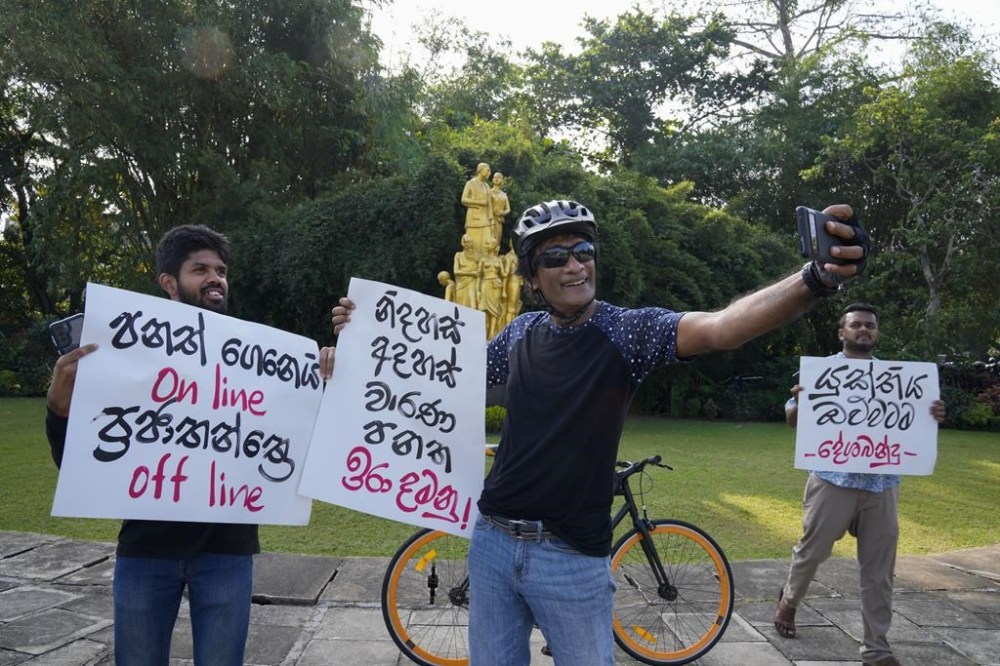Sri Lankan lawmakers debate controversial internet safety bill amid protests by rights groups
Advertisement
Read this article for free:
or
Already have an account? Log in here »
To continue reading, please subscribe:
Monthly Digital Subscription
$0 for the first 4 weeks*
- Enjoy unlimited reading on winnipegfreepress.com
- Read the E-Edition, our digital replica newspaper
- Access News Break, our award-winning app
- Play interactive puzzles
*No charge for 4 weeks then price increases to the regular rate of $19.00 plus GST every four weeks. Offer available to new and qualified returning subscribers only. Cancel any time.
Monthly Digital Subscription
$4.75/week*
- Enjoy unlimited reading on winnipegfreepress.com
- Read the E-Edition, our digital replica newspaper
- Access News Break, our award-winning app
- Play interactive puzzles
*Billed as $19 plus GST every four weeks. Cancel any time.
To continue reading, please subscribe:
Add Free Press access to your Brandon Sun subscription for only an additional
$1 for the first 4 weeks*
*Your next subscription payment will increase by $1.00 and you will be charged $16.99 plus GST for four weeks. After four weeks, your payment will increase to $23.99 plus GST every four weeks.
Read unlimited articles for free today:
or
Already have an account? Log in here »
Hey there, time traveller!
This article was published 23/01/2024 (650 days ago), so information in it may no longer be current.
COLOMBO, Sri Lanka (AP) — Sri Lankan lawmakers on Tuesday began debating a controversial internet safety bill that has been criticized by opposition politicians, journalists and rights groups as a move by the government to stifle freedom of speech.
Public Security Minister Tiran Alles introduced the bill in Parliament, saying it seeks to address problems related to online fraud, abuse and false statements that threaten national security and stability.
He said the laws are necessary to deal with offenses committed online, noting that last year more than 8,000 such complaints were filed with police related to sexual abuse, financial scams, cyber harassment, data theft and other offenses.

However, media, internet and civil rights groups say the bill would have “a chilling effect on free speech,” as several provisions would serve to undermine human rights and freedom of expression. The groups have demanded that the government withdraw the bill.
Lawmakers are expected to vote on the bill on Wednesday.
The bill aims to establish an online safety commission with “wide-ranging powers to restrict free speech” that could direct users, service providers and others to “take down content and block access to accounts on extremely vague and overbroad grounds,” said Article 19, a rights watchdog, and 50 other groups.
Opposition lawmaker Rauff Hakeem said the government is trying to throttle freedom of speech in Sri Lanka, adding that “a very oppressive environment is going to be created.”
“This is a manifestation of a government which is trying to dismantle even the remaining few safeguards for freedom of expression in this country and to destroy democracy,” Hakeem said.
Alles rejected the accusations, saying the bill was not drafted with the intention of harassing media or political opponents.
Debate over the bill comes as Sri Lanka struggles to emerge from its worst economic crisis, which hit the island nation two year ago. The country declared bankruptcy in April 2022 with more than $83 billion in debt, more than half of it to foreign creditors.
The crisis caused severe shortages of food, fuel and other necessities. Strident public protests led to the ouster of then-President Gotabaya Rajapaksa. The IMF agreed last March to a $2.9 billion bailout package.
Under new President Ranil Wickremesinghe, the severe shortages of food, fuel and medicine have largely abated over the past year and authorities have restored power supply. But public dissatisfaction has grown over the government’s effort to increase revenue by raising electricity bills and imposing heavy new income taxes on professionals and businesses.
Media and civil rights groups accuse the government of trying to introduce more repressive laws in an attempt to “suppress the public’s right to expression as a narrow effort with the aim of winning the upcoming elections at any cost.”
Sri Lanka’s presidential and parliamentary elections are likely to be held later this year or early next year.

